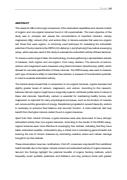P a g e | vii ABSTRACT This research offers a thorough comparison of the antioxidant capabilities and mineral content of organic and non-organic bananas found in UK supermarkets. The main objective of the study was to compare and assess the concentrations of important minerals, namely magnesium (Mg), calcium (Ca), and sodium (Na), in banana samples that were non-organic and those that were organic. A commonly used technique for evaluating the antioxidant potential of food products is the DPPH (2,2-diphenyl-1-picrylhydrazyl) free radical scavenging assay, which was also used in this study to evaluate the antioxidant activity of these bananas. To ensure a wide range of data, the methodology involves gathering a representative sample of bananas, both organic and non-organic, from many retailers. The amounts of sodium, calcium, and magnesium were measured using Atomic Emission Spectroscopy (AES), which allowed for accurate quantification of these minerals. The DPPH assay was used to measure each type of banana's ability to neutralise free radicals, a measure of its antioxidant potential, in order to evaluate antioxidant activity. The mineral study showed that, in comparison to non-organic bananas, organic bananas had slightly greater levels of calcium, magnesium, and sodium. According to this research, bananas that are organic might have a marginally superior nutritional profile when it comes to these vital minerals. Specifically, calcium is essential for maintaining healthy bones, and magnesium is important for many physiological processes, such as the function of muscles and nerves and the generation of energy. Despite being ingested in excess frequently, sodium is necessary to preserve fluid balance and neuronal function. A more balanced diet may benefit from the higher mineral content found in organic bananas. Apart from their mineral richness, organic bananas were also discovered to have stronger antioxidant activity than non-organic bananas. According to the results of the DPPH assay, organic bananas were more effective at scavenging free radicals, indicating that they have better antioxidant qualities. Antioxidants play a critical role in maintaining general health and lowering the risk of chronic diseases by minimising oxidative stress and cellular damage brought on by free radicals. These observations have two ramifications. First off, consumers may benefit from additional health benefits due to the higher mineral content and antioxidant activity of organic bananas. Second, the findings highlight the potential benefits of organic farming methods, which frequently avoid synthetic pesticides and fertilisers and may produce foods with greater
